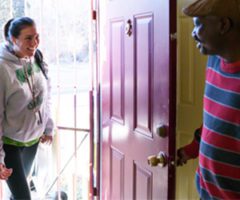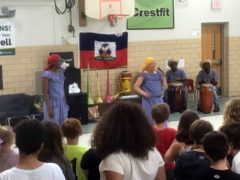First Capacity Building Grants Awarded
In 2022, we have selected the first recipients of our Organizational Capacity Building grant: HOME WORKS! and Springboard to Learning. Through these one-time matching grants, YouthBridge will cover 75% – or up to $7,500 – of costs related to projects intended to strengthen the capacity and sustainability of nonprofit organizations.
“Nonprofits are indispensable to the fabric of our community, yet their mission-driven work intersects with all of the responsibilities of running a business,” says Barbara Carswell, YouthBridge CEO. “Part of our goal as a community foundation is to help strengthen those areas they struggle with so that their vital work can continue unimpeded.”

HOME WORKS!
Colleen Polak, CEO of HOME WORKS!, says the grant funds are helping to do just that. “When I moved into the CEO role last year, my primary objective was to ensure that our strong, evidence-based program would continue, and I knew that fundraising was the area where we needed to build capacity.” The grant has provided the down payment to hire a fundraising consultant to help create and execute a plan, and who will “also hold us accountable,” she says.
“The best part, I think, is the validation of YouthBridge’s support,” adds Polak. “It shows people that there are those that believe so much in the importance of our work, they are willing to support us in these other areas.”
Polak says the vision of HOME WORKS! (HW!) is to reach 10,000 families over the next 10 years with a model it’s been refining for over 15 years. HW! designed and implements a teacher home visit program that helps teachers in underserved schools engage parents in their child’s education. The program involves training, supporting and paying teachers to make home visits to students and their families and working with teachers to implement parent engagement strategies and events such as parent-teacher workshops.
“Students spend just 14% of their year in school, yet teachers must shoulder 100% of their education. It’s a formula that’s failing our kids, because they’re coming into school behind and never catching up,” says Polak. “Research clearly indicates that students do better when parents and teachers work together.”
The problem, she says, is that most teachers don’t have the time, resources or training to partner with families. Similarly, parents with low socio-economic status often have little time for providing academic enrichment in the home and may not have been raised with an emphasis on education. “We’re about providing the tools to help fill those gaps.”
One of the strategies HW! helps teachers employ with parents is turning games or everyday activities into learning experiences. “Parents don’t need to worry about taking hours out of their day to help their child understand schoolwork,” says Polak. “Simple things like going through the mail together, playing Wordle on their phone, counting the red doors on their walk to school, they’re all learning.”

Springboard to Learning
Springboard to Learning believes that the arts also are a valuable part of learning. “Actually, we know it for a fact. Studies show that exposure to the arts improves a student’s performance in reading, math and science,” explains Cathy Hartmann, Executive Director of Springboard to Learning. The nearly 60-year-old organization, an affiliate of Young Audiences Arts for Learning and Wolf Trap Learning Through the Arts, works to give economically disadvantaged children in St. Louis the opportunity to experience music, dance, theater and all the arts disciplines.
Largely school-based, Springboard engages teaching artists – all independent contractors – who bring “literally 100 different programs” into schools that foster creativity, expression and many other skills, while broadening students’ worldview, says Hartmann. “Our artists also help teachers infuse arts into classroom curriculum,” she says, using the example of connecting music or dance to demonstrating the different stages of the water cycle.
“What we know is that students that aren’t linear learners do better with this approach, and kids with special needs often will come out of their place of isolation,” she says. Hartmann was once approached by the grandparent of a young student with autism, thanking her for the opportunity he had to learn piano. “I was a little confused, because we hadn’t been giving him piano lessons; rather, a guitarist had been coming to perform music from around the world. It dawned on the two of us that he’d been going home and sounding out on the piano the music she had been playing on the guitar.”
Hartmann wants to see Springboard continue to build on its “powerful work” in special needs and early childhood education. With the YouthBridge capacity building grant, they have engaged a consultant to help with strategic planning, as well as evaluating the impact of COVID. “Our programming levels haven’t returned to where they were and funding has changed. I am so grateful to have the support in looking at where we are now, financially and operationally, and charting a course for the future.”
If you would like to donate or have any questions about these organization, please contact Allison McDonald.
